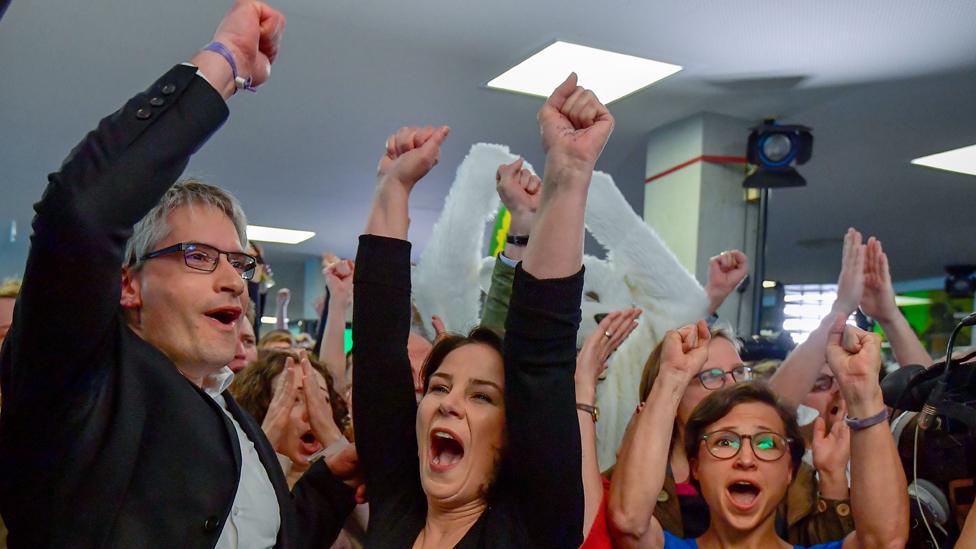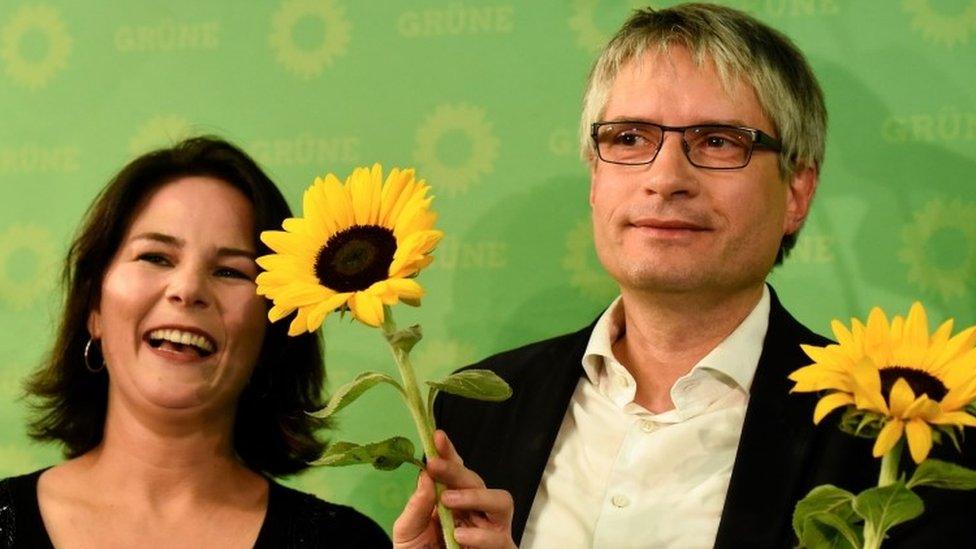European elections 2019: Country-by-country roundup
- Published

The German Greens (pictured) did much better than the nationalist AfD
The EU's political landscape was shaken up in this election, with the traditional centre-left and centre-right blocs losing their overall majority.
Populist and nationalist parties fared well in Italy, France and Hungary, but did worse than expected elsewhere, notably in Denmark and Germany.
The European Parliament is likely to be a more volatile place. Greens and liberals performed well overall, so they could now have a bigger impact. The results here are not final, but most votes have been counted.
Austria (18 seats)
The ruling conservative People's Party (ÖVP) won with a record 34.9%, despite a scandal that led to the collapse of its coalition government with the far right. ÖVP leader Sebastian Kurz was removed from his post of chancellor in a parliamentary vote shortly afterwards.
The far-right Freedom Party (FPÖ) - which quit the government after its leader Heinz-Christian Strache was exposed in a video "honey trap" sting - was not crushed by the scandal. Provisional results show it came third, with 17.2%, down only slightly from 2014.
Belgium (21)
In Belgium's big night of European, federal and regional elections it was far-right Flemish party Vlaams Belang (Flemish Interest) that made all the headlines.
It won three seats in the European Parliament poll, but surged to second place in the national vote for the federal parliament. Vlaams Belang wants the northern Flanders region to split from the rest of Belgium.
Bulgaria (17)
The ruling centre-right Gerb party of Prime Minister Boyko Borisov won with 30.6%, against 26% for its arch-foe, the socialist BSP.
Mr Borisov's very active campaigning in the past week is reckoned to have pushed Gerb ahead of the BSP.
Croatia (11)
The governing nationalist HDZ won four seats - two fewer than expected - so it tied with the opposition centre-left SDP, which also won four seats.
Cyprus (6)
There was little change politically - the conservatives won narrowly, the ruling DISY taking two seats with 29%, followed by socialist AKEL (27.5% - two seats).
Czech Republic (21)
Prime Minister Andrej Babis won a convincing victory for his liberal ANO party, meaning ANO will send six MEPs to Brussels.
The conservative Civic Democrats (in the European Conservatives and Reformists bloc) came second, winning four seats.
Denmark (13)
It was a disappointing night for the far-right Danish People's Party (DF), who lost around two-thirds of their votes, coming fourth.
Prime Minister Lars Lokke Rasmussen's Venstre Liberal Party overtook DF to become the biggest Danish party in Europe, taking 23.5%.

Estonia (6)
Estonia's liberal Reform party won with 25.5%, followed by the Social Democratic Party with 23.3%. Each got two MEPs, while Prime Minister Juri Ratas' Centre Party and the far-right Conservative People's Party of Estonia (EKRE) got one each.
Finland (13)
The Finnish Green party (VIHR) won a record 16%, coming second behind the centre-right National Coalition Party.
The far-right Finns increased their vote share and retained their two seats.
France (74)
The far-right National Rally (RN) led by Marine Le Pen came top with 23.3%, narrowly beating President Emmanuel Macron's liberal alliance led by LREM (22.4%)
It was a symbolic blow to Mr Macron, who has been under pressure from the "Gilets Jaunes" (yellow vest) protests. He is one of the strongest pro-EU voices in the bloc, calling for major reforms and challenging the parliament's centrist establishment.
Germany (96)
The big winners were the Greens - they nearly doubled their seats, coming second with 20.5%, and the big losers were the Social Democrats (SPD), falling to 15.8%.
In 2014 the SPD had got 27.3%.
Chancellor Angela Merkel's Christian Democrats (CDU) still won, but haemorrhaged support.
The far-right AfD did worse than many expected, winning 11%.
Greece (21)
It was a bad night for Prime Minister Alexis Tsipras's left-wing Syriza party - it was well beaten by the opposition conservative New Democracy party (ND). ND got 33.3%, compared with Syriza's 24%.
Mr Tsipras said he would call snap elections, which may take place at the end of June.
Hungary (21)
It was another night of election success for Prime Minister Viktor Orban, whose nationalist Fidesz party is currently suspended from the centre-right EPP group in Europe. Winning 52% of the vote, he declared his anti-immigration platform a success.
"Hungarians gave us three tasks. Foremost, stopping immigration all across Europe. They gave us the task to defend the Europe of nations and to protect Christian culture in Europe," he told supporters.
He could pull out of the EPP and embrace the embryonic nationalist alliance, changing the parliamentary arithmetic.
Ireland (11)
The centre-right Fine Gael party of Prime Minister Leo Varadkar scored a big victory, exit polls suggest. But Ireland's electoral system means the results will take some time to come through.
Italy (73)
It was an historic win for the right-wing, anti-immigration League of Deputy Prime Minister Matteo Salvini. His party got 34.3% - confirming him as one of the strongest anti-establishment leaders in the EU.
But the centre-left Democratic Party (PD) surprised many by coming second with nearly 23%.
It was a disappointing night for the League's populist coalition partners, Five Star, who slumped to 17%.
Latvia (8)
New Unity, the ruling centre-right party topped the poll with 26.4% and took two seats.
The left-wing Harmony party and right-wing National Alliance also gained two MEPs each, with 17.45% and 16.4% respectively.
The Latvian Russian Union and liberal pro-EU Development/For! won one seat each.
Lithuania (11)
The Homeland Union-Lithuanian Christian Democrats came out on top with 19.7% - translating to three seats.
The Social Democratic Party (LSDP) and the Lithuanian Farmers and Greens Union (LVZS) followed behind with two seats each.
Luxembourg (6)
The Christian Social People's Party ceded one seat to Luxembourg's Democratic Party - who edged them as the national winners by only 0.3% of the vote. Each party took two seats.
The Greens and the Socialist Workers' Party each kept a single MEP .
Malta (6)
It was a good night for Prime Minister Joseph Muscat's Labour Party, which won four of Malta's six European parliament seats - gaining one seat and increasing its vote share compared with the 2014 elections.
The opposition Nationalist party saw its vote share dip but took the country's remaining two seats.
Netherlands (26)
The Dutch Labour party (PvdA) won with 19% of the vote - a dramatic, unexpected comeback for the centre-left.
The liberal VVD of Prime Minister Mark Rutte got 14.6%.
The newcomer nationalist party of Thierry Baudet, FvD, got 10.9%, leaving the Freedom Party of Geert Wilders far behind and without any seats.
Poland (51)
The ruling conservative, anti-immigration Law and Justice (PiS) party came top with 45.6%, well ahead of the pro-EU European Coalition (38%).
It was a record 43% turnout - the highest since Poland joined the EU in 2004 - and a litmus test for national elections later this year.
Portugal (21)
The centre-left Socialist Party (PS) won with 33.4%.
The centre-right PSD came second with 22% and remarkably the new green party PAN won a seat for the first time.
Romania (32)
The ruling Social Democrats (PSD) - blamed by the European Commission for sluggish progress in tackling corruption - slumped to second place, with 23.4%. The centre-right PNL came top with 26.8%.
The vote was accompanied by a referendum on the government's judicial reforms - an initiative by the president, which irritated the government.
Slovakia (13)
A new coalition of pro-EU parties won with 20%, so it will send four MEPs to Brussels: two liberals and two centre-right MEPs.
Three seats go to the ruling leftist Smer party, which got 15.7%.
Slovenia (8)
An opposition coalition of two anti-immigrant parties - Slovenian Democratic Party (SDS) and conservative agrarian Slovenian People's Party (SLS) - won with more than 26.4% of the vote, translating to three seats.
The coalition government's centre-left Social Democrats and Populist List of Marjan Sarec (LMS) got two MEPs each.
Spain (54)
It was a convincing win for the ruling Socialists of Prime Minister Pedro Sánchez, who took 32.8% - that is, 20 seats.
It bolsters his power, coming after his April triumph in national elections, though he did not get a majority.
The conservative Popular Party (PP) - similarly pro-EU - was second with 20% (12 seats). For the first time a Spanish far-right party, Vox, got elected to Brussels, with three seats.
Sweden (20)
The ruling centre-left Social Democrats won safely with 23.6%.
The liberal-conservative Moderates were second, with 16.8%.
There has been much media attention on the far-right, anti-immigration Sweden Democrats: they came third, winning two seats.
United Kingdom (73)
It was an extraordinary election for the UK, whose negotiations on leaving the EU are deadlocked. The election was organised late, after the UK missed a 29 March Brexit deadline.
Voters punished the ruling Conservatives and opposition Labour Party, with many backing the new anti-EU Brexit Party of Nigel Farage.
The Brexit Party won with 31.7%, and the Liberal Democrats stormed into second place, with 18.5%.
- Published27 May 2019

- Published27 May 2019